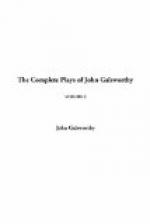Soldier. Daisy, which of us will you ’ave?
The girl. [Covering her face] Oh! Him!
Soldier. You see, mate! Put your ‘ands down. There’s nothin’ for it but a laugh. You an’ me know that. Laugh, mate!
The man. You blarsted——!
[The girl springs to him and stops his mouth.]
Soldier. It’s no use, mate. I can’t do it. I said I’d laugh to-day, and laugh I will. I’ve come through that, an’ all the stink of it; I’ve come through sorrer. Never again! Cheerio, mate! The sun’s a-shinin’! He turns away.
The girl. Jack, don’t think too ’ard of me!
Soldier. [Looking back] No fear, my dear! Enjoy your fancy! So long! Gawd bless you both!
He sings, and goes along the path, and the song fades away.
“I’ll
be right there to-night
Where
the fields are snowy white;
Banjos
ringing, darkies singing
All
the world seems bright!”
The man. ’E’s mad!
The girl. [Looking down the path with her hands clasped] The sun has touched ’im, Jim!
Curtain
PUNCH AND GO
A LITTLE COMEDY
“Orpheus with his lute made trees And the mountain tope that freeze.....”
PERSONS OF THE PLAY
James G. Frust ..............The Boss E. Blewitt Vane .............The Producer Mr. Foreson .................The Stage Manager “Electrics"..................The Electrician “Props” .....................The Property Man Herbert .....................The Call Boy
OF THE PLAY WITHIN THE PLAY
Guy Toone ...................The Professor Vanessa Hellgrove ...........The Wife George Fleetway .............Orpheus Maude Hopkins ...............The Faun
Scene: The Stage of a Theatre.
Action continuous, though the curtain is momentarily lowered according to that action.
PUNCH AND GO
The Scene is the stage of the theatre set for the dress rehearsal of the little play: “Orpheus with his Lute.” The curtain is up and the audience, though present, is not supposed to be. The set scene represents the end section of a room, with wide French windows, Back Centre, fully opened on to an apple orchard in bloom. The Back Wall with these French windows, is set only about ten feet from the footlights, and the rest of the stage is orchard. What is visible of the room would indicate the study of a writing man of culture. ( Note.—If found advantageous for scenic purposes, this section of room can be changed to a broad verandah




